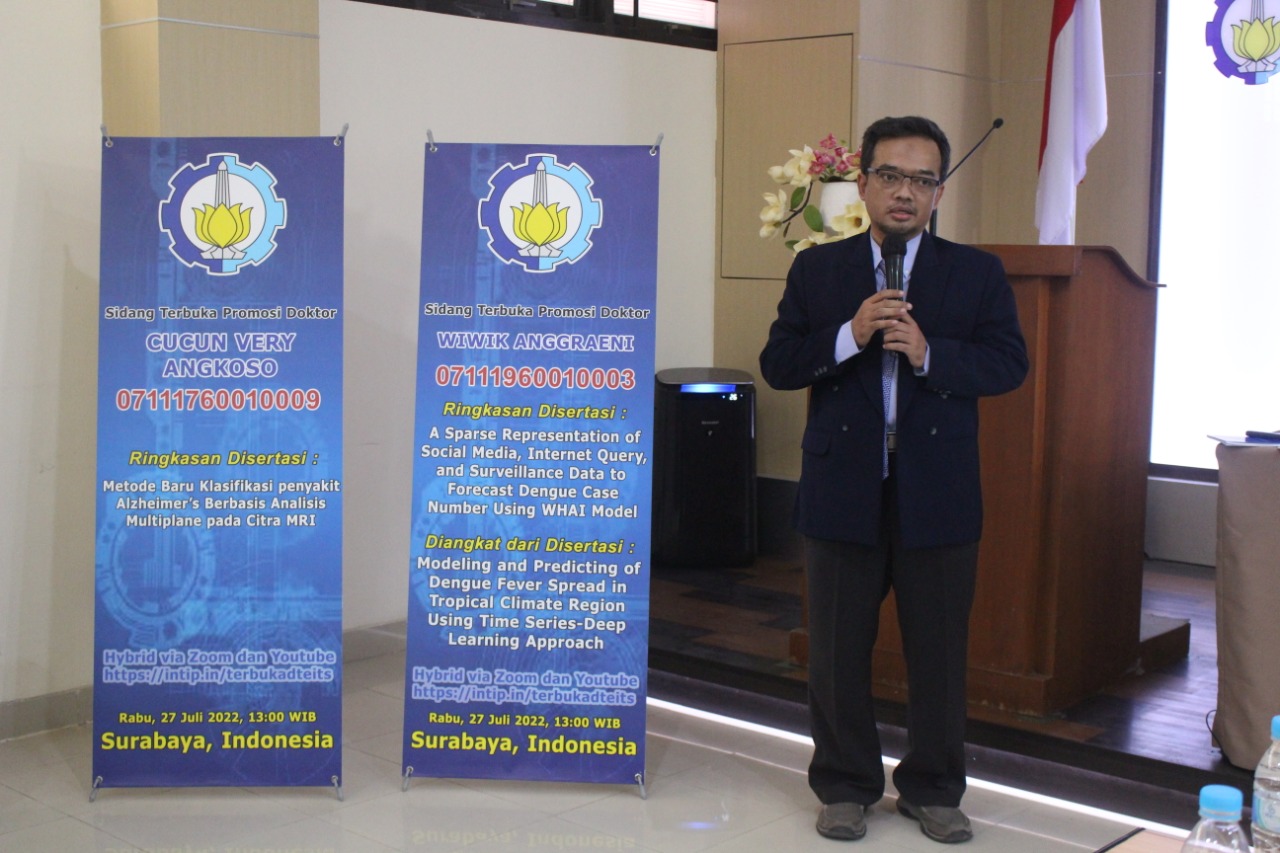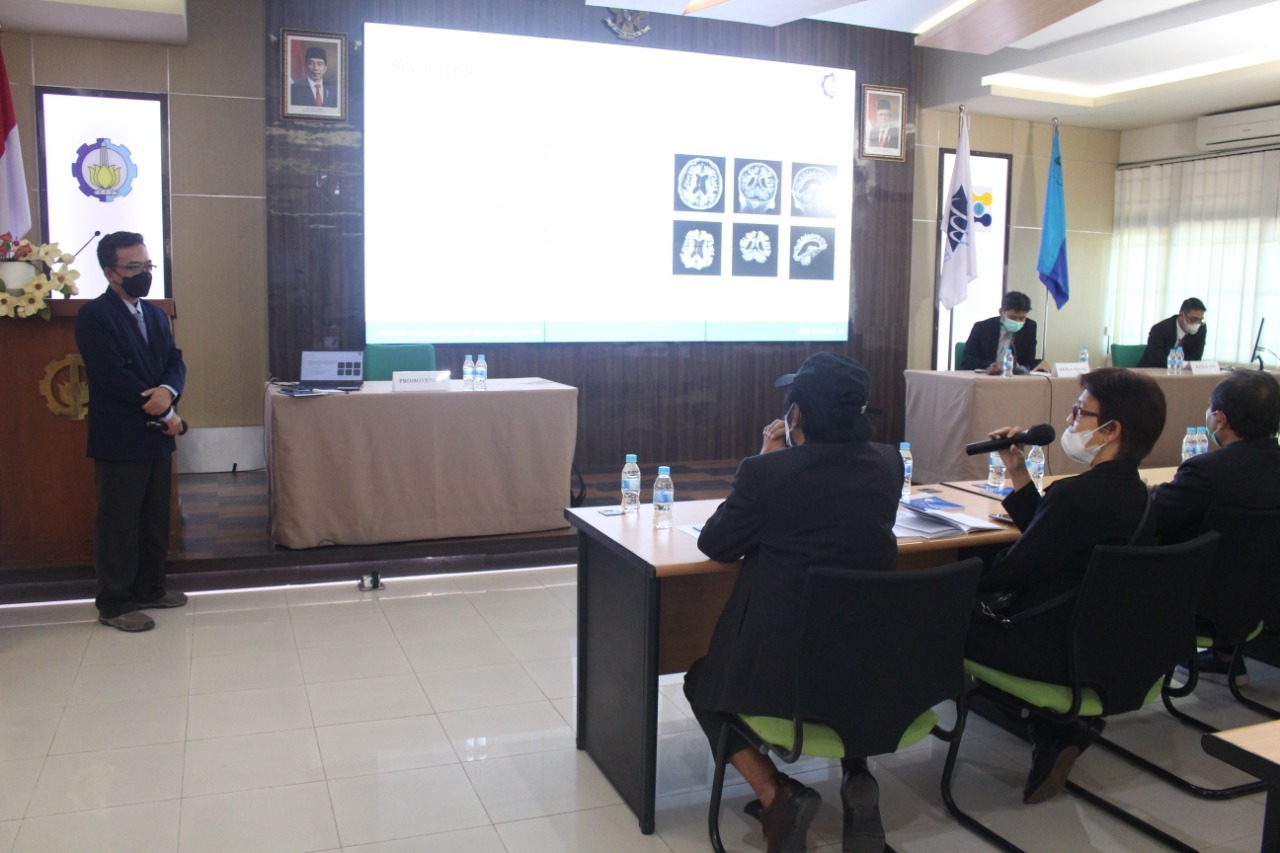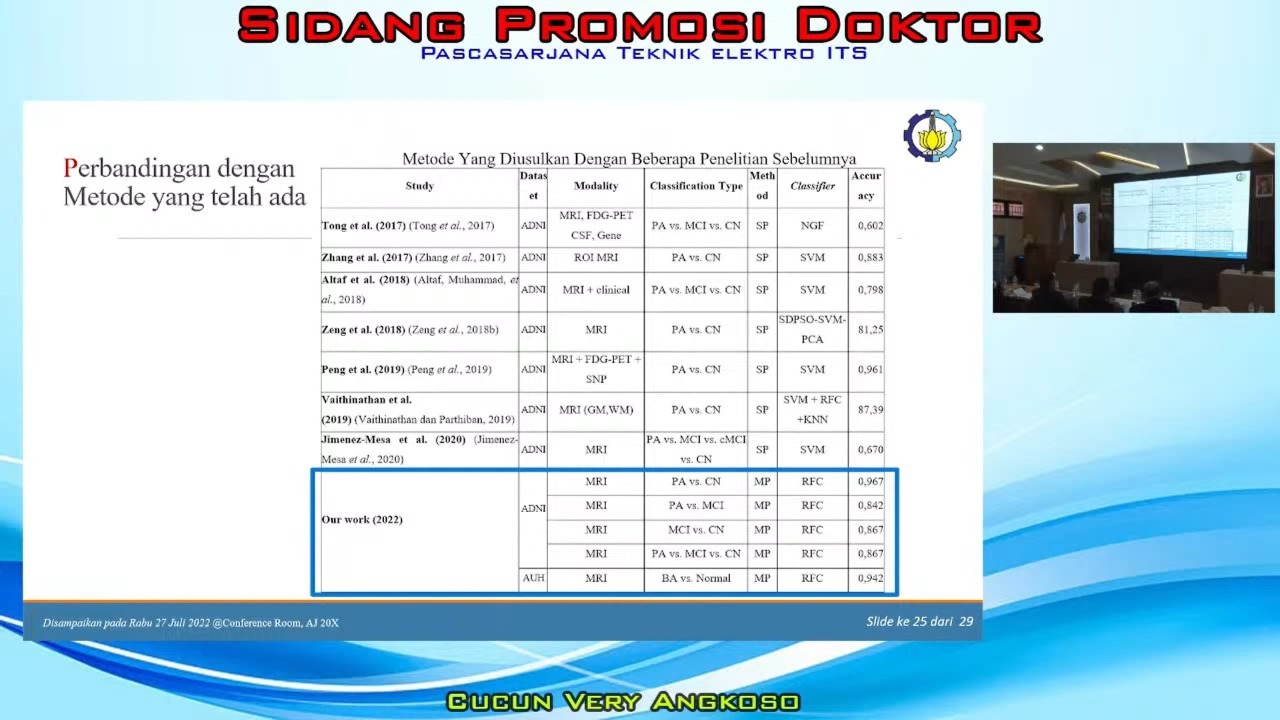Earn a Doctorate through the KYCHO Method for Alzheimer’s Disease Detection

Cucun Very Angkoso when presenting his dissertation entitled “KYCHO” Method on 3D-MRI Imagery for Classification of Alzheimer’s Disease
ITS Campus, ITS News – Showing its best existence in producing quality academic cadres, Institut Teknologi Sepuluh Nopember (ITS) again produces graduates with doctoral degrees. Coming from the Department of Electrical Engineering Doctoral Program, Cucun Very Angkoso successfully achieved his doctorate through his research on the Alzheimer’s Disease (PA) detection method last Wednesday (27/7).
The presentation of the dissertation entitled “KYCHO” Method on 3D-MRI Imagery for Classification of Alzheimer’s Disease begins by exploring the background of the increasing number of PA cases. However, the existing tools still do not have sufficient effectiveness. “Currently, the Region of Interest (ROI)-based method used is still very dependent on the knowledge and expertise of the test operator,” said Cucun.
Further explained, the accuracy of early detection is highly dependent on the experience of testing operators if this ROI-based method is still continued. It also considers that there is no clear evidence that other brain areas are not atrophied or damaged.

Question and answer session Cucun Very Angkoso with the examiner lecturer at the Open Session of the ITS Electrical Engineering Department Doctoral Promotion
The innovation of the KYCHO Method, which is an acronym for the name of its proponents (Ketut Eddy Purnama, Cucun, and Mauridhi Hery Purnomo) has the main focus on simultaneous processing of three-dimensional (3D) Magnetic Resonance Imaging (MRI) images simultaneously. Moreover, with a two-dimensional (2D) image analysis approach.
To provide more understanding and reduce the computational burden, the team chose to view 3D objects but in 2D views. Furthermore, Cucun uses a multiplane system and Machine Learning that allows object detection more thoroughly from several sides.
Again reviewing the idea, the KYCHO Method consists of several stages: image pre-processing, cranial bone image removal (skull removal), brain image slice selection, feature extraction, feature selection, and PA classification. “One of the main goals of this study is to improve the system’s performance in detecting PA patients,” he explained.

Comparison of the effectiveness of the KYCHO Method with other existing methods
The method proved to be more effective when comparing the three classifications of brain conditions in testing the KYCHO method, namely PA, Mild Cognitive Cognitive Impairment (MCI), and Cognitively Normal (CN). This is indicated by the accuracy results in binary and multi-class classification tasks to detect Alzheimer’s of 0.967 on PS vs CN and 0.867 on multi-class classification tasks.
Moreover, it also shows an increase in average performance for all classifications. “The evaluation results show that our new approach outperforms all previous related methods,” he said optimistically.
The man who also serves as a lecturer at the Department of Informatics Engineering at Trunojoyo Madura University added that there are several things that can be done in further research. One of them is related to the development of image preprocessing techniques and feature selection methods.
The dissertation work with the supervisors Dr I Ketut Eddy Purnama ST MT and Prof Dr Ir Mauridhi Hery Purnomo MEng was successfully presented in front of the examiners. “This learning and development process will not stop here, in the future this research will continue to be refined,” he concluded. (ITS PR)
Reporter: Faadhillah Syhab Azzahra
Related News
-
ITS Rises to Second Rank in Most National PKM Funding
ITS Campus, ITS News – Strengthening its determination in the scientific field, the Institut Teknologi Sepuluh Nopember (ITS) succeeded
August 04, 2022 14:08 -
Examining Kenny, the Best ITS Bachelor Graduate with a GPA of 3.94
ITS Campus, ITS News — Educating for 3.5 years at the Institut Teknologi Sepuluh Nopember (ITS) did not prevent Benedictus
August 04, 2022 14:08 -
Inspirational, Deaf ITS Graduates Graduated with Cumlaude Predicate
ITS Campus, ITS News — An inspiring story was also present at the 129th Graduation Ceremony of the Institut Teknologi
August 04, 2022 14:08 -
129th Graduation: ITS Graduates 1,355 Candidate Leaders
ITS Campus, ITS News – Institut Teknologi Sepuluh Nopember (ITS) again held a graduation procession for its students through the
August 04, 2022 14:08
